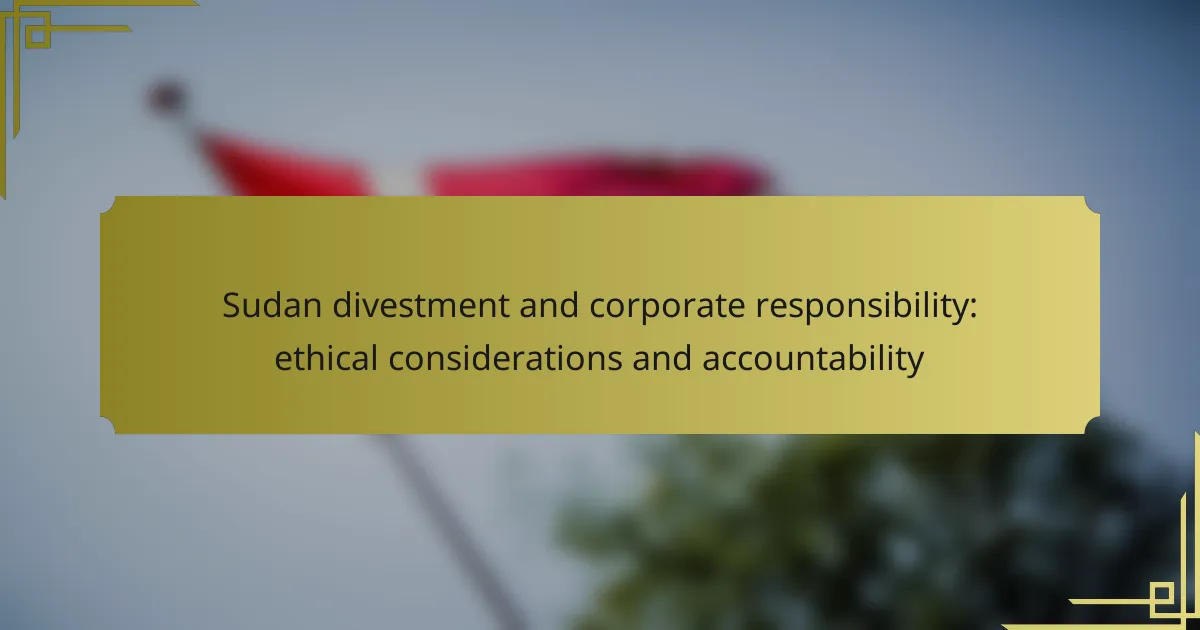Sudan divestment refers to the withdrawal of investments from companies operating in Sudan due to ethical concerns, particularly in response to human rights abuses in the Darfur region. The movement gained traction in the early 2000s, with organizations such as universities and pension funds taking action to pressure the Sudanese government for policy changes. This article explores the implications of Sudan divestment on global business practices, emphasizing the importance of corporate responsibility, transparency, and accountability. It highlights how ethical considerations are shaping investment strategies and influencing corporate behavior, as well as the anticipated trends towards stricter guidelines for responsible sourcing and increased demand for corporate accountability in addressing social issues.

What is Sudan divestment and corporate responsibility?
Sudan divestment refers to the withdrawal of investments from companies operating in Sudan due to ethical concerns. Corporate responsibility involves the obligation of businesses to act ethically and contribute positively to society. The movement for Sudan divestment gained momentum in the early 2000s in response to human rights abuses in the Darfur region. Many organizations, including universities and pension funds, divested from companies linked to the Sudanese government. This action aimed to pressure the Sudanese regime to change its policies. Corporate responsibility in this context emphasizes transparency and accountability in business practices. Ethical considerations drive companies to evaluate their impact on human rights and social justice. Divestment is seen as a tool for promoting ethical corporate behavior.
Why is Sudan divestment important for corporate responsibility?
Sudan divestment is important for corporate responsibility because it aligns business practices with ethical standards. Companies that divest from Sudan signal their opposition to human rights violations and support for social justice. This action helps to hold governments accountable for their actions. It also reflects a commitment to corporate ethics and social responsibility. By withdrawing investments, companies can influence positive change in conflict regions. Studies show that divestment can impact a country’s economy and policies. For instance, the 2006 divestment movement against Sudan aimed to pressure the government to end violence in Darfur. Therefore, Sudan divestment is a crucial step in promoting ethical corporate behavior.
What historical context underpins the need for Sudan divestment?
The historical context underpinning the need for Sudan divestment includes a prolonged civil conflict and human rights abuses. The Darfur genocide, which escalated in 2003, resulted in the deaths of hundreds of thousands and the displacement of millions. The Sudanese government, accused of supporting militias responsible for these atrocities, faced international condemnation. Economic sanctions and divestment became tools for activists and investors aiming to pressure the regime. In 2007, the Sudan Divestment Task Force was established to guide institutions in withdrawing investments from companies supporting the Sudanese government. This movement gained traction as awareness of the humanitarian crisis grew. The historical context is crucial for understanding the ethical implications of corporate responsibility in relation to Sudan.
How does corporate responsibility relate to divestment in Sudan?
Corporate responsibility relates to divestment in Sudan by emphasizing ethical business practices. Companies may choose to divest from Sudan to avoid complicity in human rights abuses. The Sudanese government has been linked to violations, including violence and oppression. Divestment serves as a protest against these actions and aligns with corporate values of social accountability. Many investors seek to support businesses that reflect their ethical standards. For instance, the divestment movement gained traction during the Darfur conflict, highlighting corporate roles in social issues. This relationship underscores the importance of ethical considerations in corporate decision-making.
What ethical considerations are involved in Sudan divestment?
Sudan divestment involves several ethical considerations. Companies and investors face scrutiny regarding human rights violations in Sudan. These violations include genocide, war crimes, and crimes against humanity. Divestment aims to pressure the Sudanese government to change its policies. Ethical considerations also encompass corporate social responsibility and accountability. Investors must assess the impact of their financial involvement on local populations. Additionally, there is a moral obligation to support peace and stability in conflict-affected regions. The effectiveness of divestment in achieving these goals is debated among scholars and activists.
How do human rights issues influence corporate decisions on divestment?
Human rights issues significantly influence corporate decisions on divestment. Companies often assess their investments based on human rights records of the countries they operate in. Negative human rights conditions can lead to reputational risks and public backlash. This pressure can prompt companies to divest from regions with severe human rights violations. For instance, firms may withdraw from countries involved in conflicts or oppressive regimes. The 2015 UN Guiding Principles on Business and Human Rights emphasize corporate responsibility in respecting human rights. Additionally, investors increasingly prioritize ethical considerations in their portfolios. A 2020 report by the Global Impact Investing Network found that 77% of impact investors consider human rights in their investment decisions.
What role does international law play in guiding corporate responsibility towards Sudan?
International law serves as a framework for guiding corporate responsibility towards Sudan. It establishes standards for ethical business practices in conflict-affected areas. Companies are expected to adhere to human rights obligations outlined in treaties such as the UN Guiding Principles on Business and Human Rights. These principles emphasize the duty of corporations to avoid complicity in human rights abuses. Additionally, international law encourages transparency and accountability in corporate operations. This includes reporting on the social and environmental impacts of business activities. Compliance with international sanctions against Sudan also influences corporate decisions. Companies that fail to follow these legal standards risk legal repercussions and reputational damage. Hence, international law significantly shapes corporate behavior in relation to Sudan.
How can corporations ensure accountability in their divestment strategies?
Corporations can ensure accountability in their divestment strategies by implementing transparent reporting mechanisms. These mechanisms should detail the criteria and processes used for divestment decisions. Regular audits can validate compliance with ethical standards and divestment commitments. Engaging stakeholders in discussions about divestment strategies promotes transparency. Publicly accessible reports on divestment impact enhance accountability. Adopting third-party evaluations can provide unbiased assessments of divestment effectiveness. Training employees on ethical divestment practices fosters a culture of accountability. Monitoring and responding to community feedback can improve divestment strategies.
What frameworks exist for measuring corporate accountability in divestment?
Frameworks for measuring corporate accountability in divestment include the Global Reporting Initiative (GRI) and the Sustainability Accounting Standards Board (SASB). The GRI provides guidelines for organizations to report on sustainability impacts, including divestment actions. The SASB focuses on industry-specific standards for disclosing sustainability-related risks and opportunities. Both frameworks emphasize transparency and stakeholder engagement in corporate practices. Additionally, the UN Guiding Principles on Business and Human Rights serve as a framework for assessing corporate responsibility in relation to human rights impacts of divestment. These frameworks support accountability by providing metrics and guidelines for evaluating corporate behavior.
How can stakeholders hold corporations accountable for their divestment actions?
Stakeholders can hold corporations accountable for their divestment actions through various mechanisms. They can engage in advocacy campaigns to raise awareness about unethical practices. Public pressure can compel corporations to disclose their divestment strategies. Shareholder resolutions can be submitted to demand transparency and accountability. Legal action may also be pursued if corporations fail to meet their ethical obligations. Additionally, stakeholders can collaborate with non-profit organizations to monitor corporate behavior. Research shows that public accountability efforts can lead to significant changes in corporate policies. For instance, the Sudan Divestment Task Force has successfully influenced companies to withdraw investments linked to human rights violations.

What are the implications of Sudan divestment on global business practices?
Sudan divestment impacts global business practices by promoting ethical investment strategies. Companies are increasingly pressured to align with socially responsible practices. This shift encourages businesses to evaluate their supply chains and investment portfolios for human rights considerations. Moreover, divestment can lead to reputational benefits for companies that prioritize ethical standards. Evidence shows that firms engaging in responsible investment often experience increased consumer trust. Additionally, divestment from Sudan can influence international trade policies and economic sanctions. Such actions may lead to a broader movement towards corporate accountability globally. This trend reflects a growing recognition of the importance of ethical considerations in business operations.
How does Sudan divestment affect corporate reputation?
Sudan divestment negatively affects corporate reputation. Companies divesting from Sudan signal ethical responsibility and responsiveness to human rights concerns. This action can enhance public perception and attract socially conscious investors. Conversely, failing to divest may lead to public backlash and damage brand image. For instance, firms associated with Sudan’s government have faced scrutiny for contributing to conflict and human rights abuses. Studies show that companies perceived as socially responsible outperform their peers in reputation metrics. Thus, divesting from Sudan can bolster a company’s standing in ethical markets.
What are the potential risks and benefits to a company’s image?
A company’s image can be influenced by various risks and benefits. Risks include negative publicity, which can arise from unethical practices or association with controversial regions like Sudan. Such negative perceptions can lead to decreased customer trust and loyalty. Additionally, financial losses may occur due to reduced sales or investor divestment.
On the other hand, benefits to a company’s image can stem from ethical practices and corporate social responsibility initiatives. Companies that engage in divestment from controversial areas may enhance their reputation. Positive public perception can lead to increased customer loyalty and brand strength. Furthermore, ethical conduct can attract socially conscious investors, boosting financial performance.
How can effective communication strategies enhance corporate reputation post-divestment?
Effective communication strategies can enhance corporate reputation post-divestment by fostering transparency and trust. Clear messaging about the reasons for divestment helps stakeholders understand the decision. Addressing concerns proactively mitigates negative perceptions. Regular updates on the company’s ongoing commitment to ethical practices reinforce positive sentiment. Engaging with affected communities demonstrates corporate responsibility. Research indicates that companies with strong communication during transitions maintain higher stakeholder trust levels. For example, a study by the Institute for Public Relations highlights that transparency can improve public perception significantly. Thus, effective communication is crucial for maintaining a positive corporate image after divestment.
What lessons can be learned from past divestment actions?
Past divestment actions reveal critical lessons about corporate responsibility and ethical accountability. One lesson is the importance of aligning investments with social values. Companies that divested from Sudan in response to human rights abuses demonstrated that ethical considerations can influence financial decisions. Historical instances, such as the divestment from apartheid South Africa, show that collective actions can pressure governments and corporations to change policies. Additionally, transparency in divestment strategies fosters trust among stakeholders. Effective communication about the reasons for divestment can enhance a company’s reputation. Lastly, sustained engagement with affected communities can lead to more informed and impactful divestment decisions. These lessons highlight the significance of ethical investment practices in promoting social justice.
What successful case studies demonstrate effective divestment strategies?
Successful case studies demonstrating effective divestment strategies include the Sudan divestment movement. This movement gained traction in the early 2000s, aiming to pressure companies to withdraw investments from Sudan due to human rights violations. Notably, the divestment from companies like PetroChina and Sinopec was impactful. These companies faced significant public pressure and shareholder activism. The divestment led to a reduction in their stock prices and reputational damage. Additionally, the University of California system divested over $3 billion from companies operating in Sudan. This demonstrated a collective commitment to ethical investing. The effectiveness of these strategies was highlighted by increased awareness and changes in corporate policies regarding human rights.
How have unsuccessful divestment efforts shaped current corporate policies?
Unsuccessful divestment efforts have significantly influenced current corporate policies by prompting companies to reassess their investment strategies. Many corporations initially faced pressure to divest from Sudan due to human rights violations. When these divestment efforts did not yield the desired results, companies began to adopt more robust corporate social responsibility frameworks. As a result, firms now prioritize ethical considerations in their decision-making processes. This shift is evident in the establishment of comprehensive sustainability policies and stakeholder engagement practices. According to a 2021 study by the Global Reporting Initiative, 78% of companies have integrated sustainability into their core business strategies. Unsuccessful divestment efforts have thus led to a broader recognition of corporate accountability and the need for transparency in operations.

What are the future trends in Sudan divestment and corporate responsibility?
Future trends in Sudan divestment and corporate responsibility focus on increased ethical investment practices. Companies are expected to adopt stricter guidelines for responsible sourcing. This includes assessing human rights impacts in their supply chains. Transparency in operations will likely become a priority for investors. Additionally, there is a growing demand for corporate accountability in addressing social issues. Collaborative efforts among businesses, NGOs, and governments will be crucial. The rise of socially responsible investment funds will influence corporate strategies. Overall, a shift toward sustainability and ethical governance is anticipated in the coming years.
How is the landscape of corporate responsibility evolving in relation to Sudan?
The landscape of corporate responsibility in relation to Sudan is evolving towards increased accountability and ethical practices. Companies are reassessing their operations in Sudan due to ongoing human rights concerns. The international community is placing pressure on businesses to divest from entities linked to human rights abuses. This shift is reflected in the growing number of corporations adopting responsible investment policies. Reports indicate that firms are prioritizing ethical considerations in their supply chains. The UN and various NGOs are advocating for corporate transparency in Sudan. This evolution is evidenced by recent divestment movements targeting companies operating in conflict zones. As a result, corporate responsibility frameworks are becoming more stringent and focused on social impact.
What emerging trends are influencing corporate divestment decisions?
Emerging trends influencing corporate divestment decisions include increased focus on environmental, social, and governance (ESG) factors. Companies are prioritizing sustainability in their operations. This shift is driven by consumer demand for ethical practices. Additionally, regulatory pressures are prompting firms to reassess their investments. Economic instability in regions like Sudan also affects divestment strategies. Companies are moving away from high-risk markets to mitigate financial exposure. Furthermore, stakeholder activism is rising, pushing corporations to align with social responsibility. These trends reflect a broader shift toward accountability in corporate governance.
How can corporations adapt to changing ethical expectations from consumers?
Corporations can adapt to changing ethical expectations from consumers by implementing transparent practices. Transparency builds trust and aligns corporate actions with consumer values. Companies should actively engage with stakeholders to understand their concerns. Regular communication about ethical practices can enhance credibility. Additionally, corporations can adopt sustainability initiatives that reflect consumer priorities. For instance, a 2021 Nielsen report indicated that 73% of consumers would change their purchasing habits to reduce environmental impact. By integrating ethical considerations into their business model, corporations can meet evolving consumer demands effectively.
What practical steps can companies take to enhance their divestment practices?
Companies can enhance their divestment practices by establishing clear divestment policies. These policies should outline criteria for divesting from companies involved in unethical practices. Companies should conduct thorough assessments of their investment portfolios. This includes identifying entities linked to human rights violations or environmental harm. Regular audits can help maintain compliance with divestment goals. Transparency in reporting divestment actions is essential. It builds trust with stakeholders and the public. Engaging with stakeholders can provide insights into community expectations. Collaboration with NGOs can also guide ethical divestment decisions. These steps contribute to responsible corporate behavior and accountability.
How can corporations develop effective divestment policies?
Corporations can develop effective divestment policies by clearly defining their ethical standards and objectives. These policies should align with corporate social responsibility goals. Companies must assess their current investments in regions or sectors that conflict with these standards. A thorough risk analysis is essential to understand financial and reputational impacts. Engaging stakeholders, including employees and investors, can provide valuable insights. Transparency in decision-making processes fosters trust and accountability. Monitoring and evaluating divestment outcomes is crucial for continuous improvement. Historical examples, such as the divestment from South Africa during apartheid, demonstrate the effectiveness of such policies in driving social change.
What best practices should companies follow to ensure ethical divestment?
Companies should conduct thorough due diligence before divesting. This involves assessing the social, environmental, and governance impacts of their investments. Transparency is essential; companies must communicate their divestment rationale to stakeholders clearly. Engaging with affected communities can provide insights into the consequences of divestment. Companies should also develop a clear divestment strategy that aligns with their corporate values. Monitoring and reporting on the outcomes of divestment actions help ensure accountability. Collaborating with other organizations can enhance ethical standards in divestment practices. Lastly, companies should consider the long-term implications of divestment on their reputation and stakeholder trust.
The main entity of the article is Sudan divestment, which refers to the withdrawal of investments from companies operating in Sudan due to ethical concerns related to human rights abuses. The article examines the importance of corporate responsibility in this context, highlighting how divestment aligns business practices with ethical standards and promotes accountability. It provides historical context on the Darfur genocide, discusses ethical considerations surrounding corporate actions, and explores the role of international law in guiding corporate responsibility. Furthermore, the article outlines frameworks for measuring accountability, the implications of divestment on global business practices, and future trends in corporate responsibility related to Sudan.


